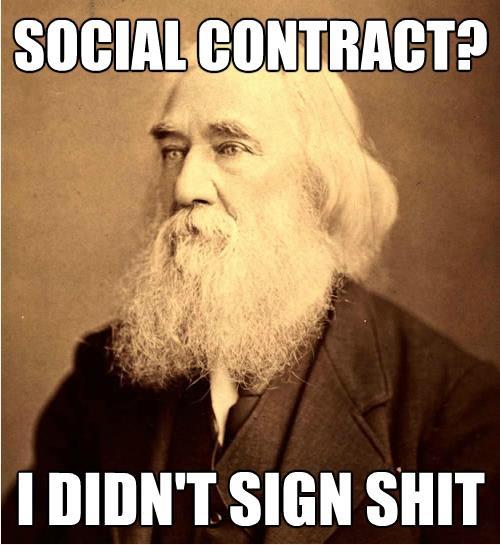I spend a great deal of time bitching about the current president, mostly because he is yet another person in a long line of assholes who have been made the figurehead of the country. I’m not sure if there will every be a president I don’t hate but Obama is a very special case because he actively campaigned on closing Gitmo, ending the wars in Iraq and Afghanistan, making the government more transparent, and ending the drug war only to do a 180 degree spin after his election. He hasn’t shutdown Gitmo, the wars in Iraq and Afghanistan are still being waged, the government is less transparent, the war on drugs is still being waged, and he has even found time to order the assassination of two American citizens.
What happened? In my opinion, power happened. The New York Times has a long article that appears to have been written specifically to inflate Obama’s ego. It tries to make him out to be a great leader by explaining all the hard decisions he’s had to make since becoming the president. Desperately it attempts to explain Obama’s actions in a way that makes it appear as though he never deviated from his campaign promises. Eight pages are used in an attempt to address this concern:
Mr. Obama is the liberal law professor who campaigned against the Iraq war and torture, and then insisted on approving every new name on an expanding “kill list,” poring over terrorist suspects’ biographies on what one official calls the macabre “baseball cards” of an unconventional war. When a rare opportunity for a drone strike at a top terrorist arises — but his family is with him — it is the president who has reserved to himself the final moral calculation.
How could a liberal law professor who campaigned against the Iraq war and torture end up ordering the death of so many individuals without a trial? According to the New York Times article Obama is a messiah who swooped down from the heavens to personally ensure only the wicked received the wrath of the United States. Gone are the days of Bush’s tyranny, smitten by the wholesome nature of the great angel Obama! He has delivered this country from evil, he has given it a conscious, he is making the difficult decisions all good leaders must make!
Bullshit.
While the New York Times attempts to take eight pages to explain Obama’s actions are due to the difficult decisions he’s had to make as president the truth is Obama tosses his campaign promises to the wind because he got a taste of power, and he liked it.
The Lord of the Rings is really a story about the corrupting nature of power, something that shouldn’t be surprising coming from a man who expressed his political views as being more and more towards anarchy. In the story the One Ring is a magical entity that can give its wearer a great deal of power but that power comes at a price, it eventually corrupts its wearer no matter how noble they are. There is little difference between the One Ring and the presidency.
I’m not aware of one president who has entered the White House and kept his campaign promises. Most presidential hopefuls have grand campaign promises that would expand individual liberty and reduce the power of the state but once they get into office they try to destroy individual liberty and expand the state’s power. Some would say this is merely because politicians are liars, a sentiment I partially agree with, although I feel there are more pieces to this puzzle. Power is another piece.
You can see the corrupting nature of power in most people. Watch a random powerless schmuck suddenly feel the need to reign power viciously over unsuspecting air travelers when you pin a badge to his chest that reads Transportation Security Administration. Suddenly that meek individual is happily shouting orders at air travelers demanding that they remove their shoes, empty their pockets, and submit to either a radiating naked body scanner or sexual molestation. Your best friend in high school can suddenly become an insufferable dick because he caught you driving faster than the posted speed limit after being issued a costume and badge by the local police department. Even the neighborhood dog catcher can go from a kind man to a rabid bastard who is screaming at you to keep better control over your dog (even when your dog is on a leash and you’re holding it).
I have no doubt many people enter politics with good intentions. They believe they can change things or make them better. Is your local school allowing children to purchase soft drinks from a vending machine? Those bastards! Don’t they understand that soft drinks are making children obese? Obviously you must run for a position on the school board to correct this monstrous failure. Once seated on the school board though the soft drinks become a minor annoyance, you now have power over everybody in the school district after all. You can do so many things, you can stop bullying by demanding any offense speech be squashed and the speaker be suspended. Children who are missing school, regardless of their grades, can also be punished, you have the power to make it so. Teachers who teach material you don’t approve of, such as evolution, can be sacked and the classroom will once again be safe for God fearing christians.
Obama may have very well entered the White House with the plan to end the wars in Iraq and Afghanistan, he may have been ready to bring a new wave of transparency to the United States government, he may have even had a bill written up that legalized medical marijuana. Unfortunately for us something happened, Obama suddenly had access to executive orders, armed drones, the military, and the entire law enforcement arm of the federal government. Suddenly he had to tools to right all of the world’s wrongs. He could stop the terrorists from performing another attack by taking out terrorist leaders, he could prevent crime by sicking the Federal Bureau of Investigations (FBI) on dissidents, the options were limitless.
What Obama never stopped to consider was the fact that every tool at the state’s disposal requires the use of violence. To a socially well-adjusted individual the idea of using violence is to be reserved as a last resort, and only as a response to initiated violence. Once you succumb to the idea that violence can be used for the “greater good” you’re soon to be entirely corrupted. Any act of aggression is justifiable when it’s for the “greater good.” Sure, some innocent people may die when a hellfire missile is launched at a terrorist leader at a wedding party but that terrorist leader won’t be able to hurt anybody else! By killing that handful of people many more lives were saved! The ends justify the means!
This is why power scares me and why I avoid it at all costs. I don’t want power over others because I know what that can lead to. Politics is a game I won’t play, I’ve seen what happens to those who do. Some of the most liberty-minded individuals I know decided to play the political game only to turn into authoritarians. They justified supporting neocons by claiming that politician had his toe in the liberty lake and with enough coaxing would dive in entirely. Sometimes they claimed the neocon was better than the alternative and that we must suffer through his or her reign because it was a babystep in the right direction. The justifications becomes endless, they were given access to the One Ring and believed they could shake the curse, they were better than those who previously held it, they could use it for good. They were wrong.
From what I’ve witnessed there are really only two outcomes for those entering politics: you either realize what it is and exit as quickly as possible or you succumb to the power and descend into a world of darkness. I played the political game for a short while and recognized it for what it was and got the hell out as fast as I could. Obama on the other hand played the political game and was seduced by the power. Did he have good intentions? That I don’t know, psychopaths are attracted to power and have no qualm with using it. Obama may have had good intentions or he may have been a psychopath before entering politics. The only important part is the outcome, he is now a power hungry creature who has been entirely corrupted. He is part of a legacy of such people who we have called presidents.
What can we do? Elect Romney? Hardly. I hope you take away from this post my warning against the seeking power. I also hope you see the underlying lesson, the corrupting nature of power means no good can come from its use. Romney could be the “lesser” or two evils but the second he gets in the White House he will become entirely corrupted and end up being no less evil than Obama. I even worry that Paul could be corrupted if he won the presidency, it’s just so much power to hold. So long as we continue to grant individuals power over us we cannot “fix” this country. No man can wear the One Ring without being corrupted just as no man can win the presidency without being corrupted. We can’t “fix” this country by electing the “right people” because the right people will quickly turn into the wrong people once they are granted presidential power.
Let me end this post by quoting Frank Herbert:
This, then, was one of my themes for Dune: Don’t give over all of your critical faculties to people in power, no matter how admirable those people may appear to be. Beneath the hero’s facade you will find a human being who makes human mistakes. Enormous problems arise when human mistakes are made on the grand scale available to a superhero. And sometimes you run into another problem.
It is demonstrable that power structures tend to attract people who want power for the sake of power and that a significant proportion of such people are imbalanced-in a word, insane.
That was the beginning. Heroes are painful, superheroes are a catastrophe. The mistakes of superheroes involve too many of us in disaster.


